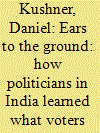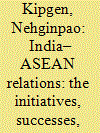|
|
|
Sort Order |
|
|
|
Items / Page
|
|
|
|
|
|
|
| Srl | Item |
| 1 |
ID:
173240


|
|
|
|
|
| Summary/Abstract |
How do politicians learn what their voters want? This article explores how Indian politicians leverage different types of interlocutors in order to develop coherent perspectives of voter wants to support policy and strategy development. It then uses innovative archival data to demonstrate how access to different types of interlocutors made key political developments possible.
|
|
|
|
|
|
|
|
|
|
|
|
|
|
|
|
| 2 |
ID:
173238


|
|
|
|
|
| Summary/Abstract |
In 2017, India celebrated its 25 years of dialogue partnership, 15 years of summit level interaction and 5 years of strategic partnership with ASEAN. The article examines India–ASEAN relations by focusing on four important issues—politics, economy, security, and social and culture. The South China Sea dispute is also analyzed to understand the security concerns both India and ASEAN have on the issue. It argues that India–ASEAN relationship will continue to grow in the future. For India, however, the relationship is geared more toward economic cooperation than any other issues. Therefore, it is unlikely that New Delhi will take confrontational measures that could escalate tensions with Beijing, at least in the near future. So long as India is hesitant or reluctant to speak out on the aggressive activities of China or take a more counterbalancing role in the SCS, ASEAN, especially the claimant states, will continue to view India as an unreliable
|
|
|
|
|
|
|
|
|
|
|
|
|
|
|
|
| 3 |
ID:
173241


|
|
|
|
|
| Summary/Abstract |
West Bengal, in comparison to other states of India, witnesses large-scale political violence throughout the year which, however, sees an upswing particularly during the time of elections. Nonetheless, apart from a few sporadic mentions, such violence is yet to get scholarly attention. Based on my longitudinal ethnography (2008–2017) in four Gram Panchayats – the lowest to the three-tier local governance system, I show the ways in which political polarization and violence occupy a dominant position in everyday village life of the state. I show that while domains of dominance-subordination and hate speech shape much of the discursive spheres of the state, people, through a variety of formal and informal channels, tend to depend on political party and panchayat. Such politico-economic dependence, development of hooligan dominated political control, and continuation of violence through direct and subtler means are some of the major roots of violence.
|
|
|
|
|
|
|
|
|
|
|
|
|
|
|
|
| 4 |
ID:
173239


|
|
|
|
|
| Summary/Abstract |
There are very few scholarly endeavors that have focused on Pakistan–India partition and their ongoing conflict from an indigenous theoretical lens. A psycho-cultural paradigm has been used in this article to reexamine and reconceptualize the enduring two-Nations theory – a political ideology, which manifests Hindu-Muslim discord in the Indian Subcontinent by construing both communities as distinct nations based on their inherent ethno-religious and civilizational differences. Considering a very complex process of mass conversion, assimilation, and crisscrossing of caste-system between both groups, this article argues that it is theoretically problematic to differentiate between Hindus and Muslims purely on ethno-religious grounds. Given the significant impact of the institution of family on the lives of the Subcontinental people, regardless of their faith – I propose that it can be more explanatory to categorize both groups as competing branches of a joint family, to understand the construction of political ideology of two-Nations theory in familial terms. This article seeks to clarify the theoretical mechanism through which the family-level ideas can shape peoples’ worldview, informing the way they perceive abstract concepts such as group-conflict and the nation, thus impacting their political thoughts.
|
|
|
|
|
|
|
|
|
|
|
|
|
|
|
|
|
|
|
|
|